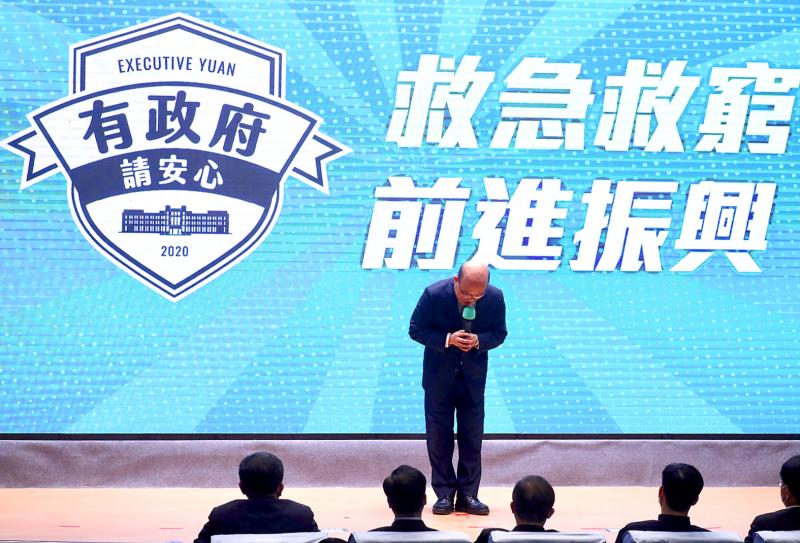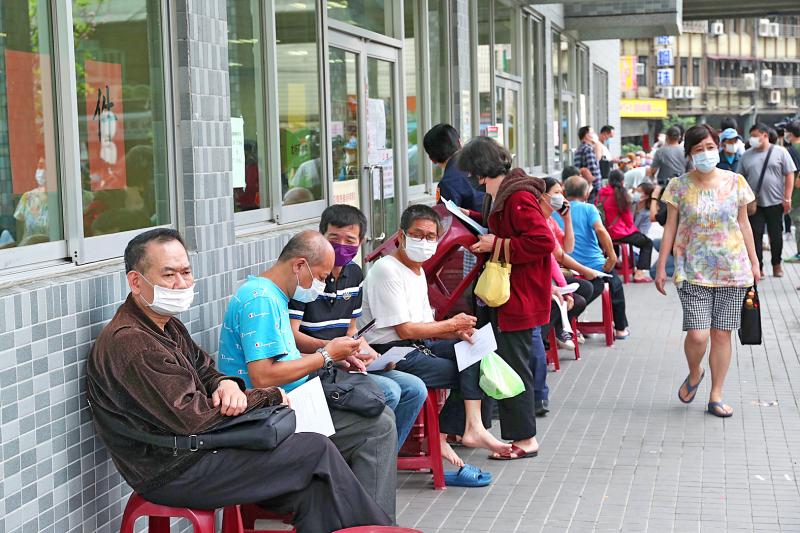Premier Su Tseng-chang (蘇貞昌) yesterday apologized and promised improvements after chaotic scenes outside local government offices on Wednesday as uninsured workers waited in long lines to apply for NT$10,000 grants, while the Chinese Nationalist Party (KMT) blasted the Cabinet for not caring about ordinary people affected by the COVID-19 pandemic.
The district offices’ lack of efficiency in handling the grant applications has come under fire, as well as the confusing eligibility rules.
Nationwide, district office employees on Wednesday only approved 12 of the 10,313 applicants, Yang Chin-ching (楊錦青), director-general of the Ministry of Health and Welfare’s Department of Social Assistance and Social Work told reporters at the Executive Yuan in Taipei.

Photo: CNA
Su later told a news conference that the chaos occurred after he did not make his instructions clear enough when he announced the grants on Monday, which led to competition among applicants.
“The government is a cohesive entity. As the leader of the team, I must assume full responsibility for the issue and reflect on my actions,” he said.
The policy was also not properly relayed to front-line civil servants, whose workload spiked due to the applications, he said, expressing his apologies and gratitude to them.

Photo: CNA
The application period is open until June 30, so there is no need to scramble to apply, he said.
Some people blamed the ministry for the debacle, but he hoped that the public would not be too harsh on the ministry, as Minister of Health and Welfare Chen Shih-chung (陳時中) had diligently led the nation in its fight against the COVID-19 pandemic and had only a limited staff to promote the bailout policy, Su said.
The grant money is not issued on the spot, he said, adding that applicants with all of the necessary identification documents would receive the payment in three to five days after being approved, while those with only their national identification card would be asked to sign an affidavit declaring that they met all of the requirements.
The affidavit says that if a review of their eligibility finds that they are not qualified, they would need to return the money and face legal penalties, although Su added that the government would be lenient, as application issues might have resulted from a miscalculation or a misunderstanding of the policy.
Asked about the media saying that his daughter, Democratic Progressive Party (DPP) Legislator Su Chiao-hui (蘇巧慧), grilling Deputy Minister of Health and Welfare Su Li-chung (蘇麗瓊) at the Legislative Yuan yesterday was a “princess coming to the king’s rescue,” Su Tseng-chang said that a recording of the question-and-answer session did not show that she “grilled” her, but was simply avidly discussing issues.
Meanwhile, Chinese Nationalist Party (KMT) Chairman Johnny Chiang (江啟臣) blasted the DPP administration for showing no empathy to people affected by the pandemic and presenting an ineffective disease relief policy.
The KMT had recommended that the government hand out cash to everyone except for rich people, he wrote on Facebook, but instead, the DPP insisted on setting up complicated relief procedures.
Many local officials have complained that the central government has not cooperated with them, which resulted in Wednesday’s chaos, he wrote, calling on the administration to improve communication with local governments.

CHAOS: Iranians took to the streets playing celebratory music after reports of Khamenei’s death on Saturday, while mourners also gathered in Tehran yesterday Iranian Supreme Leader Ayatollah Ali Khamenei was killed in a major attack on Iran launched by Israel and the US, throwing the future of the Islamic republic into doubt and raising the risk of regional instability. Iranian state television and the state-run IRNA news agency announced the 86-year-old’s death early yesterday. US President Donald Trump said it gave Iranians their “greatest chance” to “take back” their country. The announcements came after a joint US and Israeli aerial bombardment that targeted Iranian military and governmental sites. Trump said the “heavy and pinpoint bombing” would continue through the week or as long

TRUST: The KMT said it respected the US’ timing and considerations, and hoped it would continue to honor its commitments to helping Taiwan bolster its defenses and deterrence US President Donald Trump is delaying a multibillion-dollar arms sale to Taiwan to ensure his visit to Beijing is successful, a New York Times report said. The weapons sales package has stalled in the US Department of State, the report said, citing US officials it did not identify. The White House has told agencies not to push forward ahead of Trump’s meeting with Chinese President Xi Jinping (習近平), it said. The two last month held a phone call to discuss trade and geopolitical flashpoints ahead of the summit. Xi raised the Taiwan issue and urged the US to handle arms sales to

BIG SPENDERS: Foreign investors bought the most Taiwan equities since 2005, signaling confidence that an AI boom would continue to benefit chipmakers Taiwan Semiconductor Manufacturing Co’s (TSMC, 台積電) market capitalization swelled to US$2 trillion for the first time following a 4.25 percent rally in its American depositary receipts (ADR) overnight, putting the world’s biggest contract chipmaker sixth on the list of the world’s biggest companies by market capitalization, just behind Amazon.com Inc. The site CompaniesMarketcap.com ranked TSMC ahead of Saudi Aramco and Meta Platforms Inc. The Taiwanese company’s ADRs on Tuesday surged to US$385.75 on the New York Stock Exchange, as strong demand for artificial intelligence (AI) applications led to chip supply constraints and boost revenue growth to record-breaking levels. Each TSMC ADR represents

Pro-democracy media tycoon Jimmy Lai’s (黎智英) fraud conviction and prison sentence were yesterday overturned by a Hong Kong court, in a surprise legal decision that comes soon after Lai was jailed for 20 years on a separate national security charge. Judges Jeremy Poon (潘兆初), Anthea Pang (彭寶琴) and Derek Pang (彭偉昌) said in the judgement that they allowed the appeal from Lai, and another defendant in the case, to proceed, as a lower court judge had “erred.” “The Court of Appeal gave them leave to appeal against their conviction, allowed their appeals, quashed the convictions and set aside the sentences,” the judges